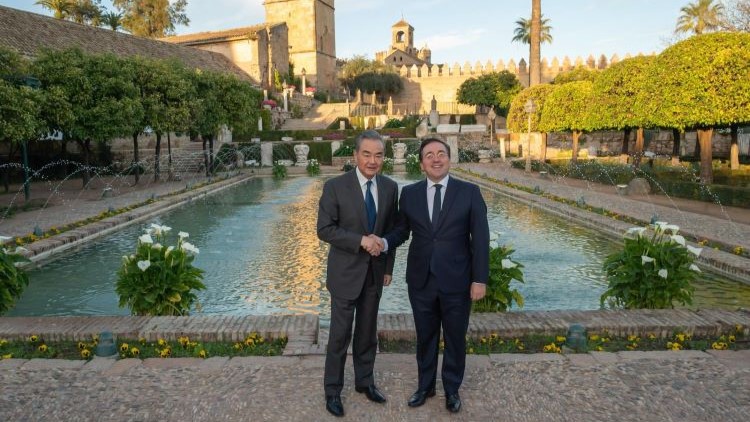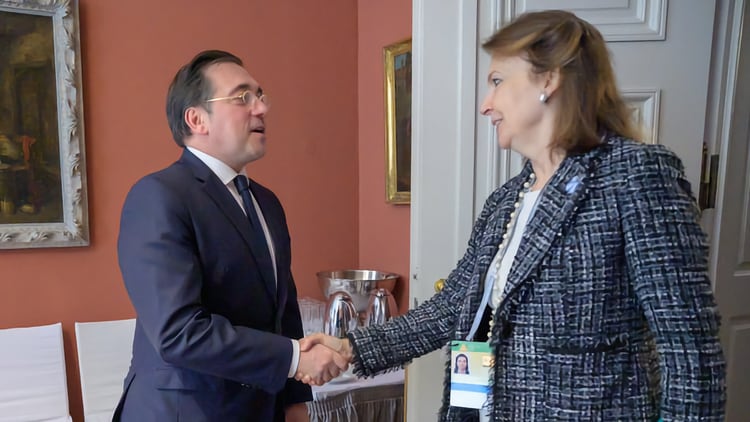The Diplomat
The Chinese Foreign Minister, Wang Yi, said yesterday, after meeting his Spanish counterpart, José Manuel Albares, in Córdoba, that his country appreciates Spain’s firm adherence to the “one China” policy.
Wang Yi, who paid a visit to Cordoba and will be received today by the King and Prime Minister Pedro Sánchez in Madrid, appreciates the fact that Spain had not backed the ideas that pointed to the call for initiatives to declare Taiwan’s independence, referring to the fact that both the PP and PSOE governments have maintained their support for the “one China” policy. Spain, like most countries, has not recognised Taiwan, a territory that maintains an Economic and Trade Office in Madrid, which acts as an ‘unofficial embassy’.
Wang Yi has been insisting in recent days, during his participation in the Munich Security Conference, that those who defend the principle of one China should also support the peaceful reunification of China.
An end to the veto on Spanish meat
In addition to Wang Yi’s statement, the meeting resulted in the announcement that China will lift the embargo on Spanish beef, meaning that Spanish products “will have free access” to this Asian market, according to what Minister Albares told journalists after the meeting with Wang Yi.
Since 2000, China has banned the European Union from exporting all types of beef products due to the cases of ‘mad cow disease’ (Bovine Spongiform Encephalopathy) recorded in several Asian countries during the 1990s.
Spain has had “negligible” risk status according to the World Organisation for Animal Health (OIE) since 2016, but until now, China maintained its veto on Spanish beef.
Albares stressed that the impact of lifting this embargo, “which we have been requesting for some time” will be “tremendously positive” due to the size of the Chinese market. And he affirmed: “I am sure that with the quality of our meat products, success will be guaranteed, and the Ministry of Agriculture will be able to give a good account of this”.
The Spanish minister thanked Wang Yi for choosing Spain as one of the few stops on his European tour”, which he considered “further proof of the excellent state of our bilateral relations and friendship between our peoples”, reports Europa Press.
Albares said that both countries maintain a “solid” dialogue that allows them to deepen the future of bilateral relations in the economic and cultural spheres.
Albares conveyed to Wang Yi “the importance for Spain of maintaining high-level contacts and activating bilateral cooperation mechanisms, such as the Joint Economic Commission and the Joint Scientific Commission that we have agreed to bring together”, as well as policy consultations at the level of State Secretaries for Foreign Affairs.
The Spanish minister asserted that Spain “has a lot to offer” through companies “on the joint path towards the green transition”. “There are many projects in the sectors of renewable energies, sustainable transport and water and waste management where joint projects can be developed,” he said.
Albares pointed out that they also discussed the teaching of Spanish in the Asian country, which, he said, “will not only open China to an understanding of Spain, but also of the Latin American countries that share a language with us”. And he expressed his gratitude for the authorisation to open a second Cervantes Institute, which “will allow a better understanding of our language” in China.
The Spanish minister also expressed his gratitude for the exemption of visas for Spaniards for stays in China of less than 15 days, which “is going to allow much more frequent contacts”, and which will be in force, on a trial basis, until 1 December of this year.
With regard to tourism, Albares said that Spain will do everything possible to bring the number of Chinese tourists to our country up to the figures prior to Covid-19″, after they had fallen by almost half in the last year.
On a global level, according to the Foreign Affairs Minister, the dialogue is “rich and dense” and, specifically on the conflict in Gaza, he said that he had agreed with Wang Yi in supporting the two-state solution, Palestinian and Israeli, in order to achieve a definitive peace”.
On Ukraine, Albares reiterated ‘Spain’s support for President Zelensky’s peace formula and the defence of Ukraine’s sovereignty and territorial integrity‘, but did not specify whether there was agreement with Wang Yi on this point. Last Saturday, the EU’s High Representative for Foreign Policy, Josep Borrell, in his meeting with the Chinese minister, urged his country to ‘support the peace formula of President Zelensky and the defence of Ukraine’s sovereignty and territorial integrity’, but did not specify whether there was agreement on this point with Wang Yi.







